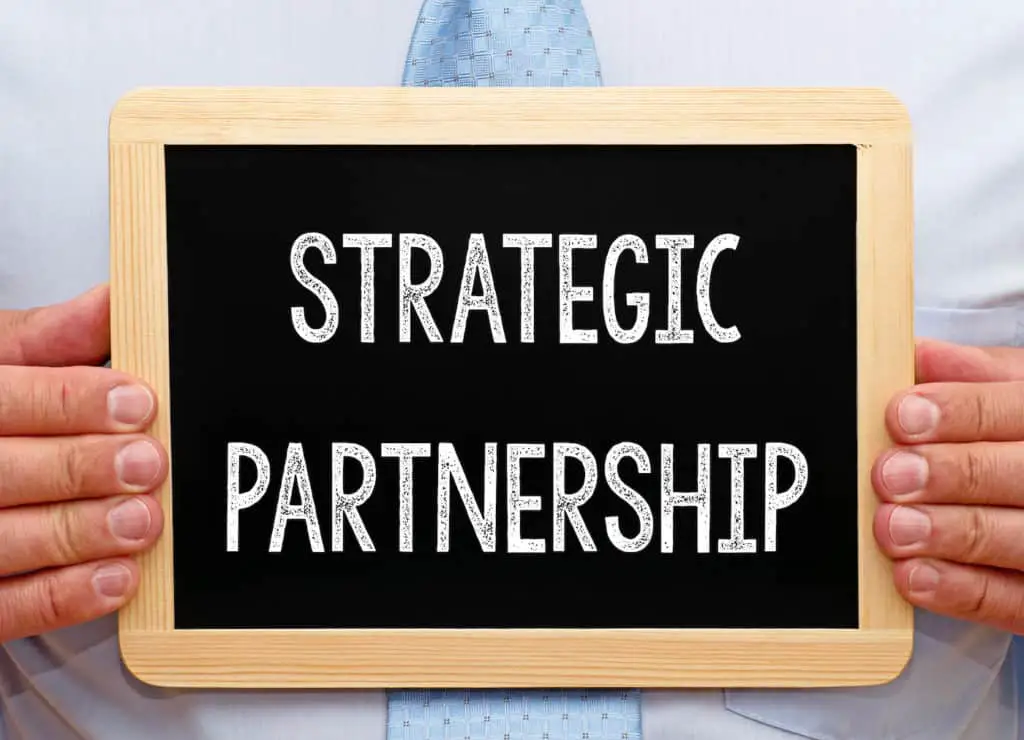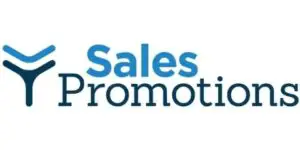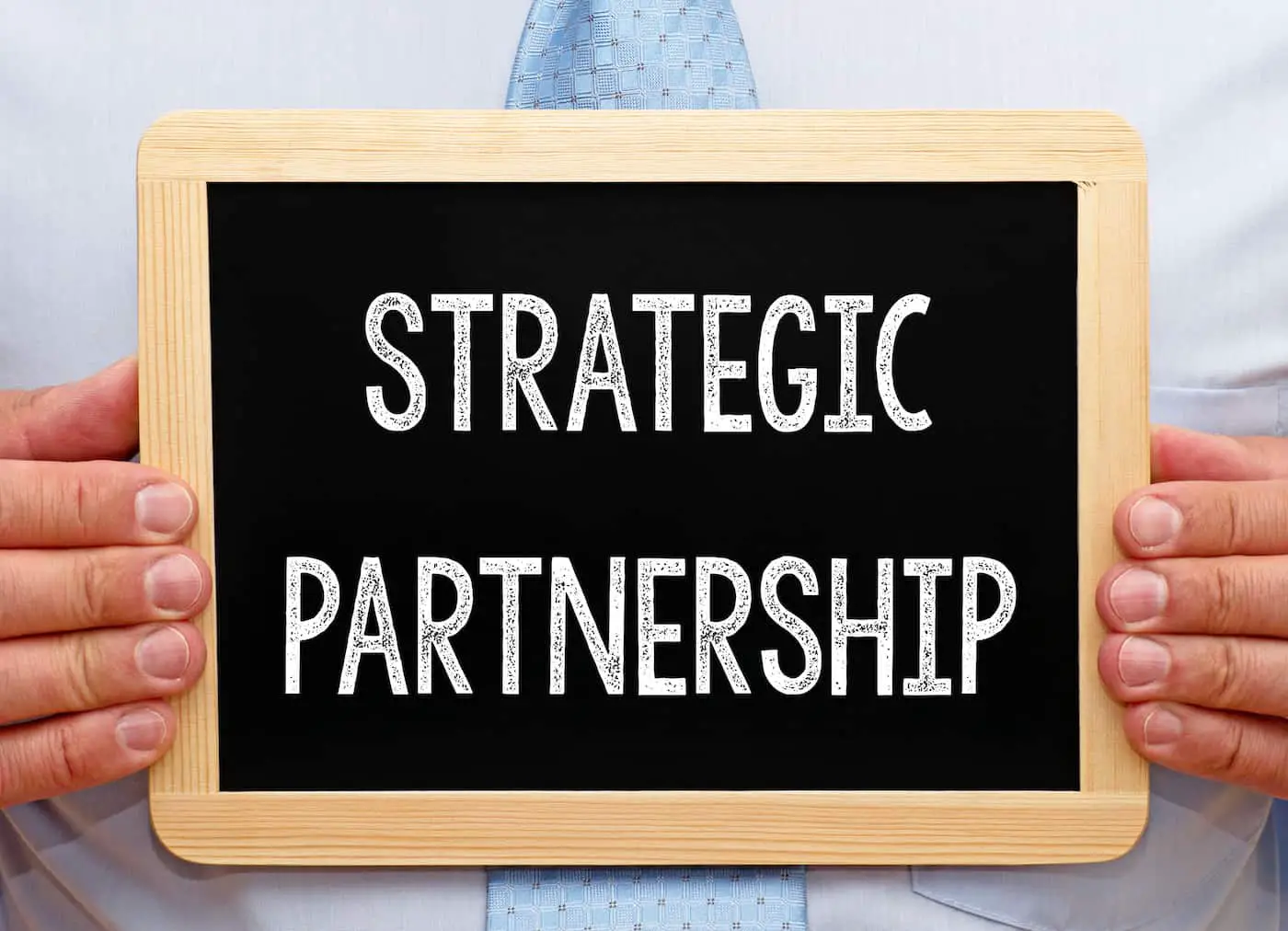*This post may contain affiliate links. As an Amazon Associate we earn from qualifying purchases.
[powerpress]

Hi, I’m Kevin Danaher.
Danette: And I’m Danette Gossett, today we are going to talk about partner marketing and why strategic partnerships are really great for your business. Kevin, you have been in business for a long time in marketing and you have put together some amazing strategic partnerships. Can you tell me why it’s so important for a business to have strategic partnerships?
Kevin: Well, having strategic partnerships allows you to expand your audience, enhance your brand perception, increase profits and create new products and launch new segments.
Danette: Well, that makes it sound like everyone should have strategic partnerships. How do they do that?
Kevin: Right. Well, basically you have to leverage what you have.
Danette: Can you give me an example so people can really get an idea of what a strategic partnership is?
Kevin: Sure, when we worked together for Avis for example we put together a partnership with Avis and ski resorts. So, Avis has cars to rent and we need to overcome the competition so, we need something special and unique to offer. We offered a product where we put the ski racks on the car and we went to the local ski resorts and we asked them for free lift tickets and for that we would advertise them and they would advertise us and give them a special rate. So, all of a sudden we have a sales promotional offer that made us exceed the competition and increase sales for us as well as the ski areas.
Danette: And it was a great program because no one goes on vacation to rent a car so this gave everybody a reason to go ahead and rent from Avis. So, that was phenomenal. But, maybe I’m a small business and what would I really have to offer a company in a strategic partnership?
Kevin: That’s funny because in life people don’t really know what their strengths are, they always focus on their weaknesses. So, for example if you were looking for a job and you saw this resume of what they wanted for the job, you probably don’t have everything but you probably have a strength in certain areas. That’s how businesses work with partnerships. What are your strengths and could you leverage them?
Danette: So give me an example of how I am a small I am a car dealership, I mean car dealerships are out there all the time. So, how can a car dealership leverage what they have in a partner marketing situation?
Kevin: Actually I did something with a car dealership. The car dealership needed something to make them stand apart from their competition. They went to see who their relationships were with. They went to a local bank and proposed the idea, of doing something together as maybe a point of sale with the bank and maybe we could advertise you.
Danette: Car dealerships are constantly advertising so that was a great thing for them to leverage. So, what did they do exactly?
Kevin: We sat down and we brainstormed and we came up with all kinds of great ideas. One is that if you purchase a car you get a 50-dollar certificate to open a new account at their bank. The car dealership and the bank shared the cost. It drove people to the car dealership to get the benefit of opening the new account. Another thing is we put together a sweepstakes where you could win the use of a car for a year like a rental or a lease of the car for a year.
Danette: Oh that’s fabulous, so both the bank and the car dealership increased their traffic.
Kevin: Exactly, that’s the best thing you want to do, you want to be able to expand on a basic level. So, to be able to do that you want to share databases, promotions, advertising campaigns, and that’s the kind of stuff that you have to leverage. Then you can create cooperative programs where you a put the two products together if you want to or you can just use their advertising or their direct mail list or their Facebook page to build exposure for yourself. There’s all kind of ways to do that, but its leveraging what you have, your relationship, your product features, the benefits that you offer. You can work together with someone to enhance their brand perception. The bottom line is you just want to expand your base of customers and your brand perception.
Danette: Yeah, because just like any business, when you are trying to grow you have to get your name out there. I love the idea of being able to share databases and being able to take advantage of my relationships. Stay with my bank and say hey, I want to be able to look at your customers and you look at my customers and we both are able to grow because we are being mutually beneficial in sharing our information.
Kevin: Exactly. And what you want to do is you want to enhance your brand perception. So, to do that you want to change behavior and in order to change behavior you have to wake people up so they can see something new and improved.
Danette: Yeah, well if I’m going to change people’s behavior, what’s an example of doing that in a recent strategic partnership? What have you done that might help us in understanding how to change someone’s behavior in doing that?
Kevin: A good example of that is something called cause related marketing. When a profit company and a nonprofit company join together to come up with a new product. The nonprofit usually has a very dedicated group of supporters who are really passionate about the cause. If you associate with that brand they may be passionate of that brand if you market that correctly.
Danette: Absolutely. I know a number of people that have done that in the past and it’s really changed their buying behavior because all of a sudden they want to support the nonprofit and they are willing instead of buying one item of clothing over another they may thing, hey they are giving money to my cause so, I want to do that. Yeah, that’s a great one.
Kevin: Levi’s a popular brand, that is maybe losing popularity I don’t know, one of their product features is that they use 96% less water in the production of their pants. They took that feature and they said how can we market that? They went out and they found that there was actually a world water day. They came up with a promotion that supported reducing water usage and providing water for a third world country. That all together became a beautiful campaign that was supported by a lot of young people on Facebook, they got 76 million hits through that and the ended the whole promotion with the fact that they used 96% less water than the competition.
Danette: That proves the point that when you are putting together a program that you want to change behavior it doesn’t necessarily have to be that you are looking to work with someone else to make money you can also be working with someone else that you believe in as a company to help change your behavior and still have that mutual benefit that we have been talking about with partnership marketing. That really does tie it all together, so I really like that idea. I think that’s a great example of what we have been trying to get across to everybody today that partnership marketing is mutually beneficial for all parties. I mean there’s shared risks and shared rewards, but with this example I think it’s all shared reward.
Kevin: So, you want to focus on the product features that you have that are unique to you, that you could use to sell partnerships with. You want to look at your positioning, how you position your product for example levis is in the position to be more outdoorsy and this whole water day was a perfect tie in. You want to also look at who the audience is that follow your brand and then the audience that follows the nonprofits brand and how you can bring them together. Levi’s example created a whole new audience who wasn’t even aware of water usage and how to reduce their water usage. So, it was a win win for everybody including the environment.
Danette: So, what would be the next area that we need to be looking at for strategic marketing promotions?
Kevin: Well you want to be able to increase profit, that’s the bottom line, so if you look at your customer base if you can find out who your most profitable customers are and model those customers so that you can share them with potential partners and come together with a product that has both your high profit list and their high profit list to increase that list. That’s the optimal process.
Danette: Now, when you are doing those types of programs, obviously one way to increase your profits is to bring in new customers. I have been in business for 24 years, I have been very fortunate I have a lot of customers who have been with me for many years. I actually have the first customer I ever got. However; as everybody knows spending goes up and down all the time and you constantly have to be looking for new customers. One might increase and another will decrease, nobody seems to increase at the same time so, I am always looking for ways to bring in new business. A strategic partnership is a great way to do that.
Kevin: Yeah. In life, as in business we all get stuck in our ways and we don’t look at new ways of doing things so if you actually meet with a new strategic partner you can actually figure out new ways to look at different audiences. It might even be ways to uncover new audiences in ways that you never even thought about.
Danette: I’m constantly a big networker, and that’s kind of a strategic partnership, it’s not a true strategic partnership in that they aren’t working with me on a particular program but in the same token they are in a sense that they are promoting everyone to do business with each other, and so, it’s a broad term of being a strategic partnership but if your kind of think of it that way I think people would work at it a little more. What’s another way of increasing our profits when we are looking at strategic partnerships?
Kevin: Well, I worked for a transportation management program which is, in the trucking industry there’s actually a lot of trucks that go out half empty and people pay a lot of money for shipping so, these transportation management systems actually partner people together to reduce their shipping costs. Companies are actually sharing space and that’s an unusual type of partnership but it’s a way to bring two people together to reduce costs.
Danette: Which increases your profits in the long run. You either have to bring in more money or stop spending so much money to make more money.
Kevin: For example, in a store your sale display could be pretty expensive but just having that display increases your revenue 20%. If you had a salsa and a nacho chip and you could do a display together it would save a lot of money and increase sales for everybody.
Danette: I like that, sharing is what partnership marketing is all about. So, what’s the last area that we look at in partnership marketing?
Kevin: It’s creating new products and launching new segments. Here’s an example if you have a cookie and I have a chocolate chip, I think a name brand chocolate chip is Hershey’s and that catapulted the brand because of the Hershey’s name.
Danette: So you look at putting your name with someone that may either have a larger presence or better name recognition or has an answer to your question of here I am looking at a Hershey’s chocolate but I really want to get because I know there’s another chocolate chip cookie so I want to get mine now into a great dough, so that’s a partnership made in heaven because that’s what everyone wants to do that. For companies that are looking to broaden their horizon, they can expand what their product offerings are.
Kevin: If you want to expand your market maybe you could go to a different segment. I did a program many years ago with the Miami Hispanic chamber of commerce, and a food company, they wanted to penetrate the Hispanic market and do a sampling campaign of the new product. We basically put those two entities together Who would have thought that a food company and a chamber of commerce would work together, but they were able to gain access to events where children were present and give out free samples of an ice cream novelty. What they also did is they developed a playground in the community. That got an incredible amount of press that they could never get otherwise.
Danette: That’s a fabulous way to end the strategic partnership. Basically to wrap this up I think we can say why should you develop a strategic partnership is it will increase your awareness it will increase your profits, it can reduce your costs it can increase your brand perception and you can definitely broaden your horizons.
Kevin: I just want you to basically step back and look at what are the features of your brand that other people would profit from. Think about how they could work together and really think out of the box and brainstorm. Figure out what the ROI would be for your partner, and then go out and make that presentation and close the deal. Thanks!
Danette: Thank you!

